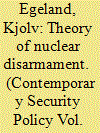| Srl | Item |
| 1 |
ID:
177545


|
|
|
|
|
| Summary/Abstract |
In this article, I focus on a subset of Obama’s foreign policy views, namely his beliefs about the appropriate circumstances under which the United States should engage in armed conflict. I argue that the Iraq war served as a formative event in the development of Obama’s worldview. He derived distinct lessons from this policy failure, leading him to articulate a restrictive set of conditions that should be met before the United States considered intervening in the internal politics of another nation, absent a direct threat to national security. I undertake a detailed examination of two case studies – the administration’s debates leading to the 2011 intervention in Libya and the decision not to intervene in Syria in 2013 – and demonstrate how the lessons of Iraq shaped Obama’s policy choices at critical junctures in the deliberations.
|
|
|
|
|
|
|
|
|
|
|
|
|
|
|
|
| 2 |
ID:
185996


|
|
|
|
|
| Summary/Abstract |
What might prompt a nuclear-armed state to give up its arsenal? Nuclear disarmament has provided a nominally shared goal for virtually all the world’s states for decades, yet surprisingly little effort has been devoted to systematically theorizing its drivers. This article aims to begin filling this void. I proceed in three steps. First, I discuss the conceptual, material, and ideational features of renunciation to arrive at a rudimentary understanding of what, fundamentally, nuclear disarmament as a political process involves. Second, I scope out the empirical evidence on which a general theory of nuclear renunciation might be based. Third, synthesizing the dominant explanations for the cases discussed in the second part, I outline a basic account of nuclear relinquishment and discuss the compatibility of this account with common assumptions about disarmament practice. I conclude that the best evidence available suggests that adversarial politics and stigmatization are necessary conditions for renunciation.
|
|
|
|
|
|
|
|
|
|
|
|
|
|
|
|
| 3 |
ID:
100760


|
|
|
|
|
| Publication |
2010.
|
| Summary/Abstract |
This article examines Austrian national identity negotiations through a qualitative analysis of the country's ideologically heterogeneous media, with a focus on Austria's most widely read paper (and its popular readers' letters pages) between April and August 2008. This turbulent period coincided with widening opposition to the EU's Lisbon reform treaty, Austria's co-hosting of the European football championship, and the collapse of the country's coalition government. This analysis of media coverage and readers' letters focuses on the rhetorical strategies underpinning various discursive constructions of Austria's place within the EU. The following key findings are discussed: projections of perceived social ills and resulting anxieties onto the EU; the interpretative uses of the past-historical episodes selected from Austrian and other national contexts-to make sense of and politicize the present; constructions of 'European ideals' in juxtaposition to perceived 'European realities'; and competing models of national identity in relation to the European 'network state.'
|
|
|
|
|
|
|
|
|
|
|
|
|
|
|
|